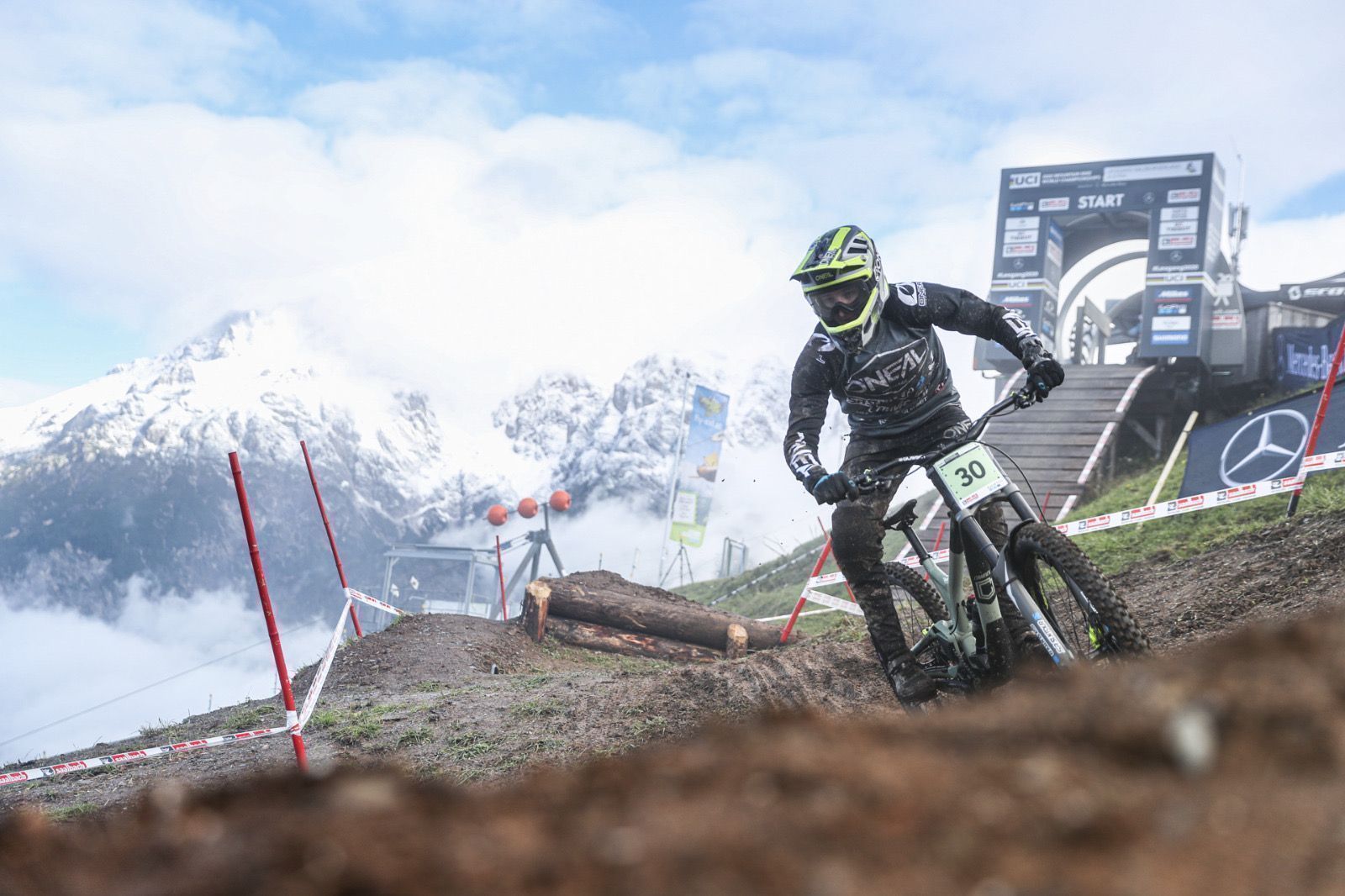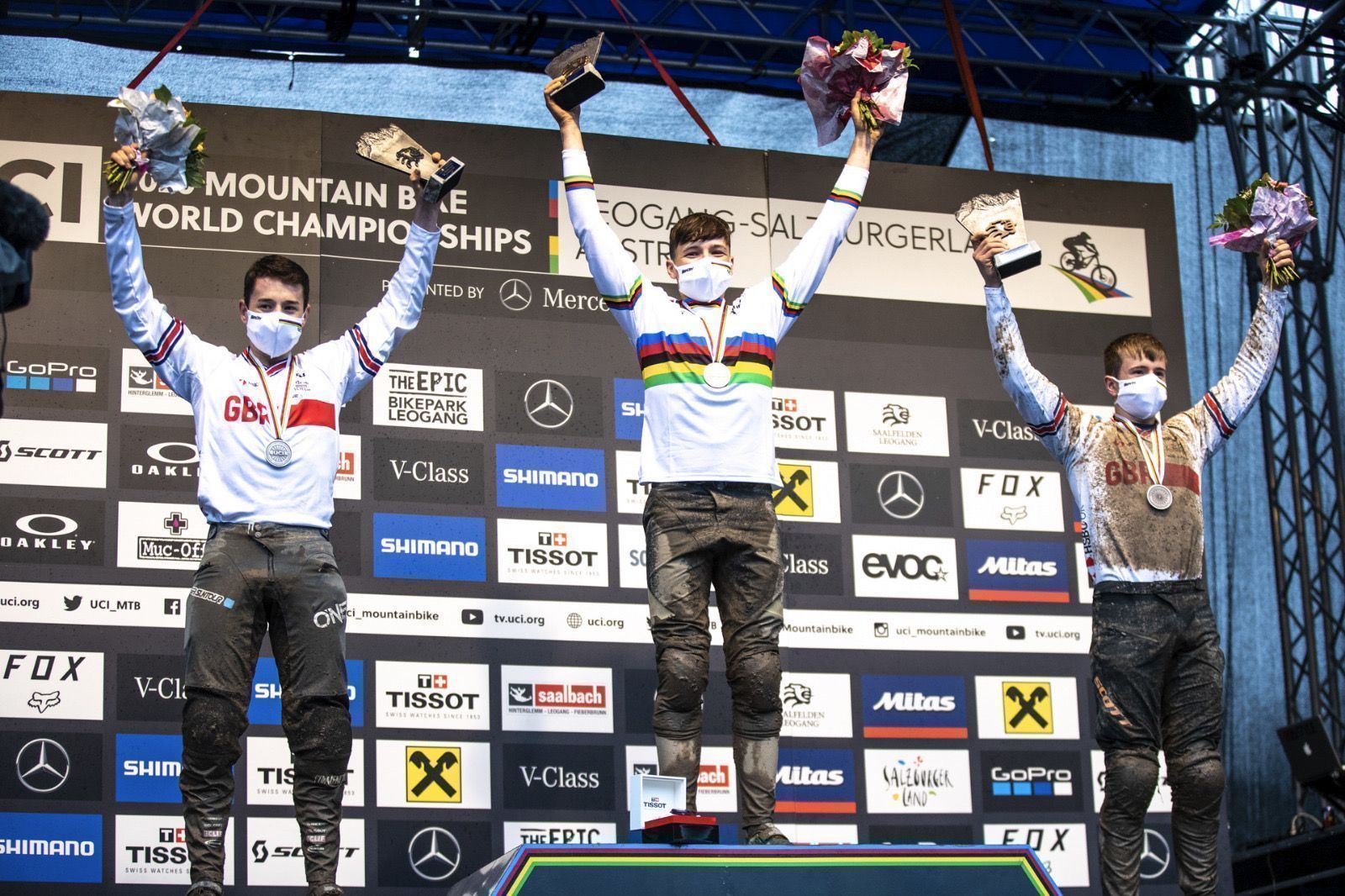Racer and team manager Jack Reading explains why he thinks British Cycling is failing its downhill athletes.
This article will be accessible by Free Members on the 23rd November. It will be accessible to non-members on the 25th November.
My name is Jack Reading, and I have been racing World Cup downhill for the last 10 years. Apart from one season racing for a small Swiss based team, I have raced as a privateer, or for One Vision Global Racing, my own professional race team. I started this team, with my Dad, in 2015 because it was so difficult to get effective help at the World Cup events.
In my career I have achieved World Cup top 20 results, won a British National Series race and represented my country at World Championships in 2017. I have a Masters degree in Optometry and have always worked as an Optometrist while racing professionally. For most racers there is very little money to be made in mountain biking, so I have never been in a position where I could afford to stop working and focus fully on racing. Currently I have three main jobs, Optometrist, professional athlete and team owner/manager.
Latest Singletrack Merch
Buying and wearing our sustainable merch is another great way to support Singletrack

The aim of our team was to support my racing, and for the first four years we were registered as a UCI MTB team, taking pit space to the World Cup races and competing against the best. In a clear attempt by UCI to discourage the existence of smaller teams, 2019 saw the team fee for small MTB teams like ours raised 25%, but for the elite teams it was left the same. We had to conclude that it wasn’t either affordable or cost effective to register as a UCI team. As a result we have even more disadvantages to overcome at the races. One of the team’s other goals has always been to help UK based riders. These riders didn’t have the support they needed to be able to race around the world. In six years we have helped six riders with their ability to race World Cups and our latest signing is junior rider Dan Slack.
This brings me to the subject of this article, which is the involvement of British Cycling, or should I say lack of it, when it comes to supporting world level downhill racing. When I raced the 2017 World Championships held in Australia, virtually everything was funded by British Cycling. They had a number of staff helping us including management, trackside line spotters, bike mechanics and a physio. We were looked after like the professional athletes we were, and it was thoroughly effective.

Credit: Remy Vroonen
As British Cycling had provided no support for World Cup races, this was an incredible experience for me, and it undoubtedly helped me to perform to my full potential. The year before, when I had raced the same track at the World Cup, I struggled and finished 54th. However, in 2017 at the World Championships I had the 12th fastest top split in my race run and finished 25th, making one small mistake in the lower sector. A massive improvement on the year before, and the great level of support I had must have had an effect.
Fast forward to this year, and the World Championships in Leogang, and we have a very different situation. British Cycling has now removed virtually all funding for the British team of downhill riders. The only funding was to send just one member of staff to help the riders with everything that goes on at the event. This was instead of the team of staff they had previously allocated.
My junior rider Dan Slack won the British Downhill Series in 2019, after only one season of downhill racing, so was selected to race at the World Championships this year. As I wasn’t a top seven elite rider from 2019 I didn’t make the selection criteria and wasn’t picked for the team. I had to make the decision as to whether to take my team setup all the way to Austria to support Dan. I run a relatively small team and we have to be very careful with our limited budget. However, my passion for athlete development greatly outweighed any monetary concerns I had, so we packed up and headed off to help Dan at the event.
The team setup for the week included myself as manager/cook/line spotter and general dog’sbody, and my personal mechanic Elliot Bond who would work on Dan’s bike for the week. We then had the 8m x 6m pit space with everything Dan needed including tools and spares. We also had the support from SR Suntour suspension technician Kevin Allemend who we pit next door to. Unfortunately not all the British riders were lucky enough to have this level of support. British Cycling provided these riders with absolutely nothing. They had nowhere to pit in the terrible weather, so most of them had parents or a friend standing at the bottom of the track with an umbrella and a bag of tools to try and help out between practice runs. The parking for these riders was about a mile down the road. Trying to prepare and race in this situation makes performing at your highest level practically impossible. Remember these riders were not just representing themselves but are actually racing for the British downhill team.
British Cycling is our national cycling federation, so the UCI provides a 30 square metre pit space for the event, free of charge. From this riders can (or could…) base themselves along with their mechanic, tools, spares, food and whatever else they need. This area is supposed to be for the XC and DH teams. However, this year British Cycling gave the entire area to the XC riders, leaving the downhillers literally out in the cold and wet. British Cycling also paid for the XC riders’ travel and accommodation costs, as well as their food for the week. Again providing nothing for the downhill riders, leaving them to organise and pay for everything themselves. Finally, British Cycling brought a team of staff for the XC riders to help with all of the athletes’ requirements, but only provided one member of staff for the downhill riders. I must say here, this person worked tirelessly all week doing his very best to help the riders with all aspects, from registration to track side line advice and everyone was very grateful to him.
Maybe you are reading this and thinking that the XC team must be more successful, and as a result receive virtually all of the available funding and resources for the World Championships. That certainly isn’t the case and in fact the opposite is true. The downhill team, made up of 18 riders, won three medals including Elite Men’s gold by Reece Wilson, and Junior Men’s silver, which I am very proud to say was my Junior, Dan Slack. The team achieved eight top 10 results. The cross-country team had nine riders and won just one medal, none at all in the elite categories, and achieved only three top 10 results. I am not at all belittling the successes of the XC athletes, but I am simply trying to compare the relative achievements of the teams and the allocation of BC support given to each.

Credit: Remy Vroonen
The one involvement British Cycling chose to have with the downhill World Championships, was to share photographs of the success of the riders. An audacious attempt to claim some kind of involvement, or credit for their achievements, after providing absolutely no help whatsoever.
As far as I understand it, the main reason British Cycling practically ignores downhill mountain biking on the world stage, is simply because it isn’t an Olympic sport, and that’s supposedly where the money comes from. However let me add this piece of information. At World Cup races British Cycling is allocated pit space for its downhill riders that have been selected to race for the national team. British Cycling doesn’t send anyone to help these riders, or provide any funding. But more significantly, at a World Cup where there is just Downhill, and BC don’t send a representative to man the space, it is left vacant. The British riders aren’t allowed to use it. Whether there are XC racers who ‘need’ the space, or not, the Downhill riders are left to fend for themselves when it comes to finding pit space. I can tell you from personal experience from years of racing World Cups, this will leave them pitting out of the back of a rental car or their own van, and not actually being allowed to park on site at the event.
Imagine coming down from a practice run with a puncture and having to push the bike a very long way to your resources. Imagine instead that you’ve got a spot in the pits, perhaps even under a cover… you don’t need to be a pro racer to appreciate the difference that would make to your ability to ride.
I personally believe British Cycling is wasting a fantastic opportunity to be much more involved in the most exciting and engaging form of cycling. Our nation has great strength and depth when it comes to talent in downhill mountain biking. British Cycling should be using this to promote itself nationally, and should be reaching out to find funding to support these talented riders and help them race against the best. Just look at how much progress the French downhillers have made in the last few years. Their national federation is fully committed to supporting their riders, providing training camps and all sorts of resources.
If I am able to help through my small team, bringing in funding and support from brands, which then helps riders like Dan win a World Championship silver medal, imagine what a huge organisation like British Cycling could do if it actually got seriously involved.
I would love to see a rethink by British Cycling, and them get right behind downhill. Starting at a national level, with development camps for riders, and taking it all the way to a World level GB downhill team. With proper support for riders who are striving to compete on the world stage we could once again be dominating those top spots. As it stands they should be ashamed of themselves providing almost nothing, then trying to enjoy the credit for an athlete’s success at the World Championships!




“What I find even more frustrating about this is that the BCF are missing a trick when it comes to encouraging kids to get on bikes.”
Because in my experience event at introductory / youth bike club level the focus is already on track, road and XC because of olympic aspirations.
Do we know how much support other countries’ national associations support their DH riders?
What do the French do?
Sad state of affairs. What is really telling is that there seems to be no engagement with those in the sport. Surely they would be better to at least have a form of dialogue with those in DH and at least not just stonewall them? Even if it just to clarify the funding position of the BCF? Smells of cowardice and poor management.
Historically & currently GB has many world class riders in the downhill scene, yet our UCI approved national body has starved them of funding & resources? I’m not surprised tbh, They don’t have the courage to look outside of their little world of elitist clubs and events that they run for xc riders as DH is considered too much a risk / injury sport for them to run. Yet….if they looked at the marketing potential from supporting dh they could have bulging bank balance to support all forms of cycling sport.
This is crying out for a response from BC, I wonder if Singletrack have thought to ask them for one?
#journalism101
@chakaping Jack was in touch with BC contacts while preparing this piece, but we’ll ask if BC wants to provide any official response.
Seems like there is an opening in the sport for a separate governing body specifically for MTB in the UK. If BC don’t have the ability/will to support some of the most successful sportspeople in the country surely the UCI should allow a “BMTB” organisation to step in?
This is nothing new from BC, even XC has been treated as the poor relation over the years. Not sending riders to gain qualification points for the Olympics, only 1 male & 1 female rider at London 2012. I remember reading articles in the 90’s about riders having to buy their own kit to represent the Country at World Champs & Olympics. Read Si Paton’s comments on why he wound up the running the DH National Champs. I get that funding is based on Olympic medal results, however the National body, should be supporting the sport at all levels & disciplines. BC have had main sponsors, Sky & HSBC over the last few years, hardly small companies. The Olympic Track team can afford those nice shiney Hope/Lotus CF bikes. Their social media channels can almost live stream track & road events, yet MTB might get a mention of a WC Jersey about a week later. Change is needed, it seems that BC is reluctant to change. I see more people out riding MTB’s than road bikes, especially youngsters. It seems stupid not supporting the MTB disciplines.